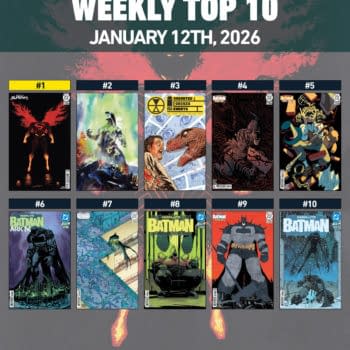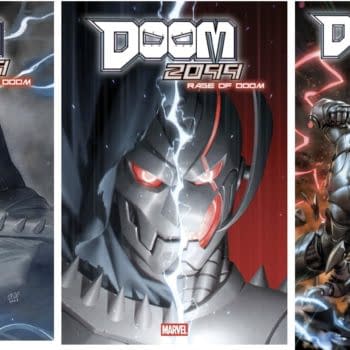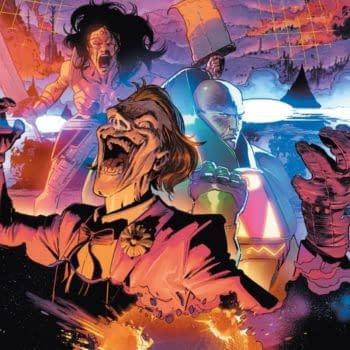Posted in: Comics | Tagged: amazon, Comics
The Most Critically Acclaimed Comics And Those Who Hate Them

Today we celebrate the art of the hater with this series of one star reviews from Amazon…
Daredevil, Vol. 1 by Mark Waid, Paulo Rivera and Marcos Martin.
Brian Bowhay "bbow73" (Centreville, VA): Although I feel this is like Batman going back to being deputized and eating hostess twinkles, I understand that many people like this 'throwback'.
Fine, but there is no rational way for Murdock to make the personality leap that Waid forces him to take.
This is an undisciplined move for a seasoned writer. Writers are supposed to allow the characters to write themselves. If Waid wanted a footloose DD this badly, it should have been a separate continuity, perhaps stories of DD set in the old days.
A Tale of Sand HC by Jim Henson, Jerry Juhl, Chris Robinson and Ramon Perez
W. Hohauser: Very much in the spirit of Henson's non-puppetry live action work in the sixties, this shelved script is given some life thru the lively work of the artist. Unfortunately by the halfway point, it became clear to me why Henson and Co. Could not find any financial interest in this work. Essentially the story has the heft of a ten minute short extended to about an hour with zero commercial potential. Some of the elements of the story are very dated especially the Arabs that chase the hero for half the book. The art is very well done with obvious influences ranging from Eisner to Kriegman to Moebius. Unfortunately the end result was underwhelming to me as the surreal, unfinished story probably could have done with a less arty panel arrangement and a more straightforward linear style.
Watchmen by Alan Moore and Dave Gibbons
William Sommerwerck (Renton, WA USA): I have nothing against comic books. They're fun. This one isn't. It's a heavy-handed (to the point of the author /spelling out/ the points he's making) and ultimately irritating in its lack of any real intellectual stimulation as a reward for the time required to read it.
The issue addressed is pretty much summed up by the title — who watches the people with power? The question itself implies almost all the possible answers. Moore does little to explore the use and abuse of power in depth. And by introducing a character — Dr Manhattan — who is, for all practical purposes, omnipotent, he discards the possibility of analyzing the question of the moral responsibility of power in "the real world". Yet he misses the opportunity to compare/contrast Dr Manhattan with God, especially with regard to his/His behavior and responsibilites.
Alan Moore doesn't /really/ understand that comic books are fundamentally visual, which is why they're so heavily populated by super-heroes and other fantasy characters. Visual media (including motion pictures) don't easily lend themselves to philosophical discussions. Had "Watchmen" been a rousing adventure story in which the philosophical issues were the subtext, it would almost certainly have worked better.
I was expecting something special (especially considering TIME's encomium *). What I got was an intellectually and visually boring book (the fixed panel size is stultifying). And what can you say about an artist who wants to be taken seriously who includes a lesbian wrestling match? Fifteen-year-olds who know little about history or philosophy might find "Watchmen" stimulating. I don't think any reasonably well-educated adult will.
If you want to read good books that reward the time and effort needed to understand them, try Bobbitt's "The Shield of Achilles" or Barzun's "From Dawn to Decadence".
* Which also happens to be a piece of electronic music by Charles Wuorinen.
Maus I: A Survivor's Tale: My Father Bleeds History by Art Spiegelman
Academic: This is as bad, as the 1st Maus: Horribly GRAPHIC, EXREMELY CRUDE and INSENSITIVE to the "OTHER" victims of the holocaust. Spiegleman shows absolutely "no" sympathy or sensitivity to the 3 million Polish-Catholics that were killed by the Germans. Adding insult to injury, he portrays the Poles in a very negative and hurtful manner, when in fact the Poles themselves lost everything. Poles, as well as Jews, lost their homes. Poles, as well as Jews, came home to homes that were piles of rubble. There are so many better vechicles out there to teach about this. This is the last one to use, as it seriously offends many innocent students whose parents and grandparents also suffered, died and lost everything in the Forgotten Holocaust. Better books are: Sybille Steinbacher's "Auschwitz. Steinbachers book gets the job done without all the grusome graphics and vulgar demeaning that is in Maus. Richard Lukas' "The Forgoten Holocaust; Poles Under Nazi-Occupation," and "Did The Children Cry: The suffering of Polish & Jewish children in the holocaust." After reading the latter one by Lukas, you'll never go anywhere near a Maus book again! "Did The Children Cry," will be a wake-up call – unless you are inhumane. Lukas, in both book, talks, OBJECTIVLY about "all" who suffered, without the sick graphics and personal attacks that maus has. Michael Marrus' "The Holocaust in History." Marrus, like Steinbacher and Lukas is controlled, scholarly and informative – Spiegleman is not. These 3 books will explain and teach you something, unlike Maus, that only teaches hateful generalizations through stereotyping and is grusomly graphic. Don't be fooled by the hype. Maus gets an F- for humanity. TEACHERS, PLEASE, BE TEACHERS!
Fun Home: A Family Tragicomic by Alison Bechdel
ObamAisAfraud: What is "fun" about a father who commits criminal acts? Had this man still been alive, he should have been brought to justice. What is tragic about this book is the praise that it receives.
The Sandman by NEil Gaiman and various.
J. Bareford: Trite, pointlessly inane stories written for folks too hip to read any other artist in the medium. Go read some Alan Moore or Mark Waid.
Preacher by Garth Ennis and Steve Dillon
h:Blasphemy in Print. Why would anyone read this filth? Why mock God?
From Hell by Alan Moore and Eddie Campbell
A Customer :I really like some of Alan Moore's other works, but he has TOTALLY missed the mark with From Hell. Despite having one of the most fascinating stories of the century (the Jack the Ripper murders) as a backdrop, he fails to convincingly develop any kind of story. I got the sense that he pieced together a lot of his own philosphical essays, inserted them into the mouths of various individuals involved with the murders, and packaged it as a graphic novel. Although Moore clearly is himself fascinated by Jack the Ripper, he fails to weave any coherent storyline around him.
Also, the graphics by Eddie Campbell are just terrible – many of the characters are indistinguishable from one another.If you (like me) are a fan of Watchmen and The Killing Joke, you will be profoundly underwhelmed by From Hell.
Batman: The Dark Knight Returns by Frank Miler and Klaus Janson
R. Harlow "XiXiDekkard": I've been reading comics for over 30 years, with a great love of all genres. I've read the big books and the little ones. For so many years, I've heard that DKR is one of the best-written books ever. I love the Bat, and I have tremendous respect for Frank Miller. I was crushed to find this book such a piece of mindless drivel, and frankly, offended. I have lost every bit of respect I ever had for Miller.The world of DKR is a harsh one, a cruel, bitter, dark, and excessively violent one. It is the only world that Frank Miller can show. Every world says the same things about ours, every character is the same bitter, grizzled, and vengeful one. Miller obviously has no hope for humanity, as he depicts us as loathesome creatures. He offers no explanation for evil, simply that evil is, and that any measures to destroy this evil must be used, even if they are greater evils. The Bat ends up taking as his allies the Sons of Batman, also dangerous criminals. There is also no accounting for the Mutant menace–they are simply left to wreck havoc upon Gotham. There is no difference, as they are still not as bad as the Batman.The Batman of DKR is a criminal, make no mistake. He is not, however, Batman. He is simply Miller's own bitter, pessimistic vengeance against our world, cloaked in the Bat's costume. He kills other criminals, uses guns against them. As Bruce's parents were shot to death, he would NEVER resort to this. Everything this character does goes against everything the Bat stands for. The ends do NOT justify the means. This Bat has already lost, before the book begins, because he has given in to the entropy of evil. Evil has won.The artwork is obviously rushed, sloppy, and boring. Not just the colors, but the penciling itself seems washed-out. I appreciate the use of panels, sometimes stuttered, to control the eye, but I don't need visual movement spoonfed, thanks. The slow-motion was nothing new, nothing unique. The use of violent images was not as well. This is hailed as a huge leap in comics, a turning point. If anything, it is a turn for the worse. This gave comics censors an excuse to bash us. The armor that the Bat wears towards the end of the book just looks silly.The depiction of Superman, as well, is ridiculous. The Man of Steel would never become a stool pigeon for a corrupt government under any circumstances–he would instead take down those who rule it. Batman and the rest of the Justice League would follow him into battle. The Batman is also apparently a huge racist, besides bloodthirsty, as he believes it would be better to send a huge bomb into Russia, rather than having it explode out in the middle of a desert.The Batman of DKR stands against everything that is good and pure in this world, speeding the world along its path into evil and entropy. This world is corrupt, for sure, as well as the government, but that doesn't mean we should just give up, as these characters have. If Miller insists on depicting such a wretched world, he ought not to exploit its heroes. He has given up hope, and tells us to as well.












